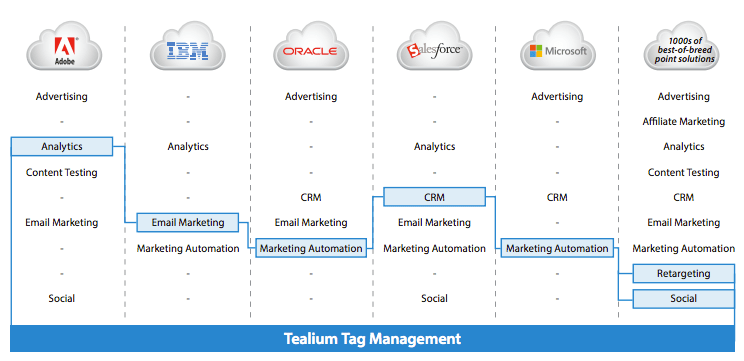Marketing cloud: Buy, Curate or Build
- Abhishek Tiwari
- Technology
- 10.59350/w1wns-b3572
- Crossref
- June 26, 2014
Table of Contents
A lot have been said and written about growing competition between major marketing cloud vendors and how they are more different than similar. We can include Adobe, Oracle, Salesforce, Google, IBM and may be Microsoft in this game of marketing cloud. With Oracle announcing unified Oracle Marketing Cloud, IBM introducing ExperienceOne, Salesforce reinventing ExactTarget Marketing Cloud, Adobe opening Marketing Cloud Exchange battle of marketing cloud is heating up.
Buy
Most of major vendors have created their own proprietary marketing clouds, mainly via acquisition. These acquisition or capability additions have helped vendors to strengthen and enhance their existing offerings as platform. As a marketer you are not buying an individual product but suit of products integrated seamlessly (at least according to sales pitches). Now vendors want to be a one-stop shop and bigger share of marketing budget by offering end-to-end integrated marketing capabilities.
Still despite all efforts vendors promise of fully-integrated marketing cloud is far from reality. Expecting an universal marketing cloud from one vendor which covers all aspects of marketing is too far-fetched. Regardless, the cost of a such a marketing cloud will be truly staggering.
Curate
There are more than 1000 (probably closer to 2000) cloud-based marketing technology solutions offering very specific set of features and functionalities. In some cases these best-in class point solutions address specific areas not offered by major marketing clouds. According to Scott Brinker, marketing cloud will never be like ERP which means these best-in class point solutions are here to stay.
Major vendors understand this gap and they are trying to tackle this problem by offering App/Data Exchanges. IBM Digital Data Exchange (DDX), Salesforce ExactTarget HubExchange, Oracle Eloqua AppCloud, and Adobe Marketing Cloud Exchange are some the examples of marketing cloud platforms where vendors are trying to lure the 3rd party and ISV to build integrated point solutions on top of their marketing cloud using platform APIs. We can include Marketo LaunchPoint in this list which offers 100+ applications that complement and integrate with Marketo.
In my opinion, currently App/Data Exchanges are most common way to curate your own marketing cloud on top of the an existing marketing platform. I consider this as mixed strategy “buy and curate”. This model has been quite successful on Salesforce AppExchange and as of now AppExchange offers about 2300 applications, 9% are marketing related.

Other way to curate your own marketing cloud is to utilise a middleware solution. As illustrated above, using a tag management systems (TMS) like Tealium marketers can easily curate their own marketing cloud, leveraging best-in-class solutions from each of the major marketing cloud providers, as well as solutions from thousands of point providers. Although this is not as simple as illustrated but most of tag management systems offer data layer and data mapping to achieve this lightweight integration. Marketing technologist Scott Brinker sees tag management as quintessential marketing middleware. In my opinion, at this stage tag management systems offer very lightweight integration on the cost of heavy-weight page. Yes that is true, marketing tags are making page load slower, heavy and impacting on user experience. We will discuss more about various middleware approach in upcoming posts.
In some cases, point-to-point integration is required and highly effective. I had several clients with Salesforce implementation messed up so badly that standard Salesforce connector apps can not synchronise data with Marketo or for that matter any other marketing system. This kind of situation arise when client start implementing non-standard use-cases. We end up writing custom point-to-point integration specific to client requirements.
Build
Building marketing cloud mean different things to different people. For some build imply developing everything ( Analytics, Targeting, Personalisation, Re-targeting, Lead Management etc.) from first principal or scratch. In fact that will be real crazy to reinvent the wheel. In recent days I ran into several people who think that emergence of big data tools and platform it will be moderately easy to develop custom build marketing cloud. I don’t advice anyone to follow this path unless you have a scale and budget even then it should be avoidable. I have my reasons. Firstly field of marketing technology is rapidly changing and by the time you build something of this scale technology will be already moved to next phase. Secondly, return on investment (ROI) is too little and too late.
To me build is more about filling the gaps by developing point solutions and integrating back these solutions to your current marketing cloud platform.
Final Thoughts
Lastly, I see some some parallels between marketing cloud and cloud computing. Over the time cloud computing has evolved from Infrastructure as a service (IaaS) to Platform as a service (PaaS) to Backend as a service (Baas) (Infrastructure → Platform → Backend). I believe marketing cloud is headed towards similar kind of situation but in a different way (Infrastructure ← Platform → Middleware ). I also see rise of infrastructure and middleware building blocks which will enable marketing teams to innovate and not be restricted by their platforms.


